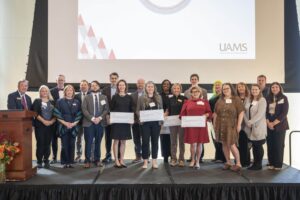In August 2023, AR Health Ventures Accelerator (ARHVA) issued a call for proposals. Now, we are excited to announce the three projects selected to be part of the inaugural cohort of this new program spearheaded by BioVentures.
The AR Health Ventures Accelerator (ARHVA) provides selected projects with substantial benefits, including financial grants up to $50,000, project management, budget allocation, and progress tracking. This unique support framework allows researchers to focus on their innovations while ARHVA ensures projects stay on track and meet crucial milestones toward commercialization. This approach significantly de-risks therapeutic development, increasing the commercial value of projects and paving the way for successful licensing, partnerships, or the launch of startups.
Meet the selected projects for the ARHVA 2024 Cohort:
The Battle Against Biofilms: A Novel Approach to Staphylococcus aureus Infections
Dr. Gyan Sahukhal leads a project targeting the challenging biofilm formation in Staphylococcus aureus infections, aiming to reduce complications by inhibiting biofilm regulators.
Biofilm formation in Staphylococcus aureus (S. aureus) infections is extremely challenging to treat and can cause many complications in patients. The therapeutic approach that was chosen for AHRVA will target regulators of biofilm formation, which will help to stop S. aureus biofilms and reduce complications from infections.
Name: Gyan Sahukhal, Ph.D.
Affiliation: Assistant Staff Scientist, Department of Microbiology and Immunology, College of Medicine, UAMS
Co-investigators:
- Mohamed O. Elasri, Ph.D.
- Mark S. Smeltzer, Ph.D.
- Meenakshisundaram Balasubramaniam, MSc, PhD
- Brendan Frett, Ph.D.
- Nirjal Mainali
Revolutionizing Cancer Therapy with Radiation-Responsive Liposomes
Dr. Samir Jenkins is at the forefront of an ARHVA-funded project, exploring a novel cancer treatment strategy using liposomes that release drugs in response to radiation. This approach seeks to enhance the precision of tumor targeting while minimizing the side effects associated with chemotherapy. By developing controllable, radiation-responsive liposomes, Dr. Jenkins’s research holds the promise of improving the efficacy and safety of cancer therapeutics, marking a significant advancement in the field of oncology.
Name: Samir Jenkins, Ph.D.
Affiliation: Instructor, Department of Radiation Oncology, College of Medicine, UAMS
Advancing Liver Injury Detection with New Biomarkers
Suspected liver injury is one of the top 5 most common reasons for termination of new drugs during clinical trials. However, there is worry that many drugs terminated due to potential liver injury are actually safe, costing pharmaceutical companies and potentially depriving patients of effective treatments. Currently, liver injury detection is based on monitoring of the enzyme alanine aminotransferase (ALT) in blood. Typically, ALT is released from dying cells and therefore reflects tissue injury. However, it is well-established that ALT elevations can occur in the absence of liver damage too. In other words, ALT can yield false positives. Thus, new biomarkers with greater specificity for liver damage are needed. We have identified a promising new biomarker to meet this need. This ARHVA funded project aims to develop a convenient and commercially viable immunoassay to measure it.
Name: Mitchell McGill, Ph.D.
Affiliation: Associate Professor, Department of Environmental Health Sciences, Fay W. Boozman College of Public Health, UAMS
These projects are anticipated to have a duration of approximately six months, and each project will receive an award of approximately $50,000 to support its completion. Stay updated on the latest developments by subscribing to BioVentures’ newsletter to be informed about the second call for proposals from ARHVA in 2024.



